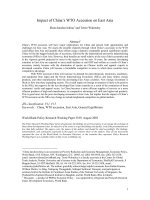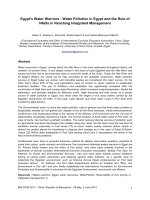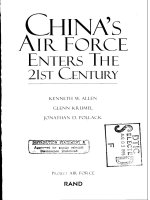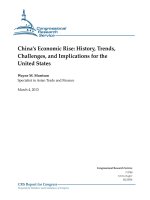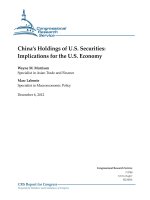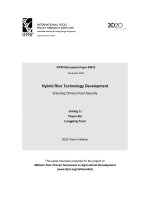Addressing China’s Water Scarcity pot
Bạn đang xem bản rút gọn của tài liệu. Xem và tải ngay bản đầy đủ của tài liệu tại đây (794.5 KB, 153 trang )
2
Published electronically
March 2003
Copyright 2003 Westchester Press
Permission hereby freely granted for non-commercial
distribution of this work in whole or in part
provided the source is properly credited.
ISBN 0-9671232-9-1
Westchester Press
2132-J Crossing Way
High Point, NC 27262
(336) 884-1038
Email:
For information on trade paperback version
(ISBN: 0-595-28067-6):
iUniverse, Inc.
2021 Pine Lake Road, Suite 100
Lincoln, NE 68512
www.iuniverse.com
To contact the editors:
Adriaan Boiten,
Richard Stimson,
Contents
Introduction - How This Book Was Written Democratically… ….… 1
C
HAPTER 1 Global Problems in Need of Solution……………….… 7
C
HAPTER 2 Perfecting Democracy in Political Systems……… … 11
C
HAPTER 3 Restoring Human Control over Corporate
Power………………………………………….……… 22
C
HAPTER 4 Making Monetary Systems Work to Benefit
People………………………………………………… 48
C
HAPTER 5 Democratizing the Communications Media……….… 62
C
HAPTER 6 The Spiritual Basis for Sustainable Living………… 75
C
HAPTER 7 Civil Society and Alternative Life Styles……….…… 80
C
HAPTER 8 Education as an Essential Tool for Finding
Solutions…………………………………………… 87
C
HAPTER 9 Summary and Conclusions………………………… 96
C
HAPTER 10 Finding out the Truth………………………… …… 116
About the Editors…………………………………………… …….149
1
Introduction—How This Book
Was Written Democratically
The origin of this book is quite unusual. Most books have
one author, sometimes two, but this book is the product of
collaboration by a large number of people in many countries
participating in an Internet forum.
Defying the adage that the only piece of good writing by
committee was the King James Version of the Bible, the members
of this forum set out to create a guide for reform of government at
all levels from global down to local communities. They aimed
especially to counter global control by financial interests at the
expense of democratic self-rule.
It all started in August 2000 when the Internet forum
“FixGov” was set up for collaborative writing on reform of
government and continued for over two years, ending with
publication early in 2003. Many of the participants came from
another forum called Alternate Culture, and quite a few had
responded to an invitation at Blue Ear Forum, largely composed of
journalists and writers from around the world.
The purpose was stated on the FixGov home page as
follows:
Fixing Government: FixGov aims to promote economic,
ecological, and social justice. We are working on a book about
government reform and we hope for ideas from many areas of the
world.
The FixGov group exists because all the efforts individuals
make for sustainable living can be offset by corporate and
government decisions. How can local, national, and international
governments be made answerable to the people they govern
instead of just the power elites? When major polluters of the
atmosphere use political muscle to escape environmental controls,
what can be done by the people who have to breathe the polluted
air? When municipal sewage dumping or industrial waste fouls
water that is vital to human health, how can people protect
2 Global Solutions
2
themselves? When large-scale corporate agriculture and food
processing distribute contaminated food and make consumers
unknowing guinea pigs for genetic modification, radiation, and
dangerous substances, how can they be subjected to effective
control?
Join a discussion seeking ways to overcome the corruption
that undermines public interest throughout the world,
overthrowing or blocking democracy in some countries, making
voting seem futile to many in the US, and secretly controlling such
UN agencies as WTO, IMF, and the World Bank.
Please make a strong effort to base your comments on facts
and remember to respect the comments of others, as your postings
will go straight through without screening by a moderator.
Some 70 people joined in this project, including members
from the United States, Canada, Mexico, United Kingdom,
Netherlands, Poland, Sweden, India, Pakistan, Bangladesh, Mali,
Australia, New Zealand, and possibly other countries (because
email addresses do not always indicate the country). Messages
were exchanged in English.
As members contributed their thoughts, a volunteer editor
was sought. When nobody offered to take on the task, the founders
inquired whether one of the particularly articulate participants,
Adriaan Boiten, would be willing to assume the responsibility. He
agreed, and in addition created a web site displaying the results of
the discussion and links to appropriate sources. That web site can
now be found at www.fixgov.com or www.fixgov.org and is
maintained by another volunteer, James McGuigan.
At the beginning the discussion on the forum was wide-
ranging and random. A difference in emphasis emerged between
those whose main concern was developing more democratic
structures in existing governmental units and others who saw more
hope in small autonomous communities living in harmony with
nature and sending representatives to bodies that would work out
means of cooperation on a larger scale. Both approaches are
reflected in the resulting book.
Introduction—How This Book Was Written Democratically 3
As editor, Adriaan Boiten defined the major topics around
which he discussion continued. Each of the chapters is based on
the work of a volunteer who summarized the consensus developed
in discussions of the forum on one of the topics. These summaries
were disseminated to the entire group, then revised in the light of
comments received. Finally, they were embodied in this book,
edited jointly by Adriaan Boiten and Richard Stimson. Any
royalties received from this work will be used to further the
objectives of the forum.
As in any forum, some people participated to a greater
degree than others, but all were able to offer their thoughts and
comment on the contributions of others. Any objections or
disagreements were taken into account when the consensus reports
were written. The most extensive work was done by the volunteers
who prepared those reports. Their backgrounds are quite diverse.
Adriaan Boiten, co-editor, engaged in historical
preservation for the City of Amsterdam for 12 years. He studied
new and theoretical history at the Municipal University of
Amsterdam, graduating in 1986, and performed civic service in the
library of the International Institute of Social History in lieu of
military service. As the proprietor of a web design business he
lives and works in the old inner city of Amsterdam.
Richard Stimson, co-editor, is an author and retired
business professor in High Point, North Carolina, serving
voluntarily as national coordinator of the worldwide International
Simultaneous Policy Organisation. Educated at Yale, Florida
International University, and the University of North Carolina at
Chapel Hill, his careers have spanned association management,
public relations, university teaching, and computer operations.
James McGuigan in England, who set up www.fixgov.org,
is working on the Earth Emergency Initiative
(www.earthemergency.org) and World Future Council Initiative
(www.worldfuturecouncil.org). He is also a webmaster and a
computer programmer, currently obtaining his degree on
Information Technology with the Open University. He is an avid
4 Global Solutions
4
contributor of articles to internet forums on a diverse range of
subjects.
Peter Scott of New Zealand has contributed ideas for
improvement of the layout design of the book.
James Hall, summarizer of the consensus on political
systems, grew up in a family of Republicans, supported Barry
Goldwater's presidential campaign and the Vietnam war, but
gradually migrated to a liberal viewpoint. A long-time resident of
Orlando, Florida, he worked 23 years for the Walt Disney
Company in jobs from ride operator to technical writer. In the
Transportation/Communications Union at Disney, he served as a
shop steward, district trustee, and finally as President and
Treasurer, representing the interests of 3,000 Disney employees.
He also was a writer and editor of the union’s district newsletter
for nine years. With a master’s degree in liberal studies, he has
taught at community college, written for The American Partisan
and several other web magazines, and is collaborating on a book
with Ian Foster.
Liane Casten, who (with Stimson) assembled most of the
material in the chapter on communications media, is an author,
journalist, film writer and director. Presently she is co-founder and
president of Chicago Media Watch, a volunteer watchdog group
that monitors the media for bias, distortions and omissions, and she
is working on her second book, an exposé of a criminal
corporation, scheduled for publication in 2002. Her first book,
Breast Cancer: Poisons, Profits and Prevention (Common
Courage Press, 1996), grew out of a cover story in Ms. on the
environmental connection to the disease. Her articles have also
been published in E Magazine, The Nation, Mother Jones,
Environment Health Perspectives, In These Times, Business Ethics,
The Chicago Tribune and the Chicago Sun-Times. She wrote and
directed four documentary films. With an M.A. from the
University of Chicago, she has also taught high school and college
classes.
Richard Gauthier, who reported the consensus for the
chapter on “The Spiritual Basis for Sustainable Living,” was born
in New Jersey, but has been living in Europe since 1986 as a yoga
Introduction—How This Book Was Written Democratically 5
and meditation teacher. In the past five years he has worked in
Poland on non-profit projects to spread organic farming in Poland
and protect small farmers regarding Poland's pending membership
in the European Union. As a member of the Ananda Marga yoga
meditation association, founded by P. R. Sarkar (who died in
1990), he made several visits to India, became a monk and an
authority on Sarkar’s concept of Microvita. The organization was
banned in India and its members blacklisted for its anti-capitalist,
anti-communist socioeconomic philosophy, its anti-corruption
stand, and a trumped-up murder charge against Sarkar later
dismissed in court. To obtain a visa to enter India he changed his
name legally from Richard F. Gauthier and got a new passport as
Richard Richardson. He has also been known as Rudreshananda in
India, and has the spiritual name of Viveka. Author of a book and
many articles about Microvita, he runs several e-mail lists on
various spiritual and scientific topics and can be reached at
William N. “Bill” Ellis, summarizer of the chapters on civil
society and on education, is a physicist, futurist, farmer working
from the home he was born in on his farm in Rangeley, Maine,
USA, to bring social change and civil globalization. He is General
Coordinator of TRANET transnational network
() and of A Coalition for Self-Learning, that
has recently published the book, "Creating Learning
Communities," which grew out of his 1998 E. F. Schumacher
Lecture in which he used homeschooling as an example of the
application of chaos, complexity, and gaian theories in the social
sphere. In the same lecture he used GrassRoots Organizations
(GROs) as subset of Non-Governmental Organizations (NGOs) as
another example of leaderless, unplanned, undesigned self-
organization and speculated that the phenomenal growth and
linking of GROs could lead to a radically different form of world
governance.
6 Global Solutions
6
7
1
Global Problems in Need of
Solution
Global communication is good; global monopoly is bad.
Worrying about global problems may seem unnecessary to those
among us who are fortunate enough to be living in a democracy
during a period of history that lacks many of the horrors of the
past. Human sacrifice, cannibalism, slavery, colonial oppression,
and many diseases are largely (but not entirely) behind us, as are
two world wars, and it is right to be thankful for the benefits we
have.
Laborsaving inventions of the Industrial Revolution have
saved many of us from the backbreaking tasks of earlier times. The
electronic age has made it possible to exchange information and
ideas rapidly around the globe. Most innovation (although aided by
government-funded research and sometimes subsidies) has been
introduced to the public by private enterprise.
Yet there are serious problems, especially as the means
now exist to destroy all humans on the planet, possibly by global
climate change and certainly with weapons of mass destruction.
Too often governments act in concert with armaments
manufacturers to promote the sale of weapons of war, sometimes
to both sides in a conflict. As an example, the foreign aid budget of
the United States currently includes many times as much “military
aid” as peaceful grants.
In the movement for sustainable development, groups of
people have tried to escape from multinational corporate tyranny
by forming self-sustaining communities, often drawing on the
8 Global Solutions
8
wisdom of indigenous cultures. These efforts for sustainable living,
however, can be offset by corporate and government decisions, as
in the case of native populations driven off their lands by mining
and drilling operations that poisoned their water supplies and
crops.
As the world becomes more interconnected, the reins of
control are found in fewer hands and most people discover they
have less control over their lives. History has known centralized
power before, but the rise of democracy in the 19
th
and 20
th
centuries raised the hope of greater personal freedom under
governments answerable to their citizenry.
Now this has often degenerated into what some call
pseudo-democracy. Many people feel their choice in voting is
between Tweedledum and Tweedledee, and so there are
widespread protests and demonstrations, including some elements
that become violent. Even some outbreaks of terrorism have their
roots in the despair of people who have lost hope in peaceful
solutions.
The tribal rivalries and centuries-old feuds between ancient
enemies are made worse by irresponsible divide-and-conquer
tactics of the great powers and marketing of armaments to both
sides in each dispute, including proliferation of nuclear, chemical,
and biological weapons of mass destruction.
When the most powerful people in the world come together
in official economic conferences (G-8, IMF, WTO, etc.) and such
unofficial groups as the Bilderberg, the Trilateral Commission, and
the Council on Foreign Relations, they remain in splendid isolation
from the less powerful people. After a series of protest
demonstrations at major cities, they have recently held their
official meetings behind strong barricades and heavily armed
police forces and/or at isolated locations.
The emphasis is on economic growth, but the measures
they use are badly flawed. Gross domestic product (GDP) is based
entirely on money transactions, thus missing the value of
housework, home cooking, child raising, do-it-yourself work at
home, “sweat equity,” and all forms of voluntary service. Robert
Eisner’s 1994 book, The Misunderstood Economy, asked: “If
Global Problems in Need of Solution 9
restaurant meals are substituted for home cooking, is that an
increase in product?” He estimated conservatively that if the value
of unpaid labor services in the home were included the 1992 U.S.
GDP would have been $8 trillion instead of $6 trillion. On the
other hand, GDP ignores economic harm done to nature and to the
health of individuals.
Prominent at these meetings are top bankers, financiers,
corporate executives, media owners, and politicians. Hardly ever
present are labor leaders, consumer representatives, or
environmentalists. Secrecy results in rumors of plots for world
control that are sometimes wild and sometimes not totally
outlandish.
There are indications that the globalization moves and
“neo-liberal” economics of these organizations have led to
increasing disparity of wealth and income both within and between
nations. In short, it is held that the rich are getting richer and the
poor are getting poorer. Details of this disparity in wealth and
income are given in Chapter 4.
A June 2002 report of the UN Conference on Trade and
Development (UNCTAD) on the poverty trap of less developed
countries investigated “whether the current form of globalization is
tightening the poverty trap and also increasing the vulnerabilities
of those countries that appear to be escaping it.” The answer was,
in effect, “Yes.” The report, however, stopped short of admitting
that World Bank, IMF, etc., are collaborating with multinational
corporations to bring about the impoverishment described in the
report. (www.unctad.org)
The specific problems that are described in the chapters on
political systems, corporate power, monetary systems, and the
communications media are very closely interrelated—and also
interwoven with concerns about education, justice, medicine,
religious freedom, land use, the oceans, and the atmosphere.
Aids to their solution are presented in the chapters on
spirituality, alternative life styles, and education. Proposed
solutions are summarized in the final chapter of conclusions.
10 Global Solutions
10
The discussion addresses how local, national, and
international governments can be made answerable to the people
they govern instead of just the power elites. The goal is to make
globalization work for the benefit of people and the environment
instead of “neo-liberal” globalization of the "wild west" variety
that has spread poverty, financial crisis, desperation, and
bloodshed in many parts of the world that have become more and
more unstable.
11
2
Perfecting Democracy in
Political Systems
(based on a summary by James Hall in
Orlando, Florida)
This chapter notes the spread of democratic elections as the
basis for governance in more countries of the world, although
imperfections exist even in the best of democracies. The forces that
concentrate wealth and power into a few hands, and that abuse the
earth's environment for their own benefit, also oppose democratic
reforms, social justice, human rights, and efforts to create a
sustainable local economy. Ways of overcoming these obstacles
and furthering genuine democracy are discussed. A “security state”
of the closed, fundamentalist and ruthless variety is not the
solution for public fears and needs generated by terrorism.
Although many people would like to conduct their
personal, family, and community lives without interference from
government, that is not the way it is. Even remote parts of the
world are coming under political control, often combined with
invasion by economic power. Thus traditional cultures in areas as
widespread as Nigeria, Brazil, Papua New Guinea, and elsewhere
are being driven off their land by the combined actions of
governments and foreign exploiting industries, including cyanide
or oil spills in their streams, destruction of their crops, and
repressive police action.
12 Global Solutions
12
There is a legitimate difference of opinion as to how much
or little government is desirable, but the alternative to
government—anarchy—has not been demonstrated to work well in
a world where greed overpowers goodwill. That makes it important
what kind of government we have. Anarchy requires an educated
and empowered independent public to work properly. It is never in
the best interests of hierarchies to allow these conditions to exist in
reality.
Although it is often far from perfect in practice, democracy
operates on the principle that no leader can be trusted to know
what people need and want better than the people themselves. It
aims to meet the desires of the majority without being unfair to
minorities.
Those who are lucky live in one of the world's liberal
democracies where generally (if not perfectly) leaders are elected
by popular vote and human rights are honored. Since 1950, the
world has seen a phenomenal growth of democracies, from 22
nations representing 31% of the world's population, to 120
electoral democracies representing 58% of the world's people.
That's a shift of historic importance, but it's not enough.
Seventy-two sovereign nations representing 42% of the world's
people still have no representative government. In such nations,
working for democracy is an important first step towards creating
social justice and a sustainable world economy. Some countries
may have a democratically elected government, but few
recognized human rights, and in some democracy and human
rights may rest on fragile foundations.
Even members of long-established democracies can't rest
but must work hard to keep elections honest and citizens’ rights
from being abused. There are powerful interests that benefit from
restricting human rights and corrupting democratic institutions.
There was a time, perhaps, when politics was a noble
statecraft, and politicians were regarded in high esteem. Politics
was not their profession; they came from various respectable
professional backgrounds; such as lawyers, physicians, teachers,
landlords etc. Politicians belonging to a party believed in the
ideology for which the party stood, and dedicated themselves in
Perfecting Democracy in Political Systems 13
fulfilling the party objectives. Today politics is a full time
profession to most politicians.
The forces that concentrate wealth and power into a few
hands and that abuse the earth's environment for their own benefit
oppose democratic reforms, social justice, human rights, and
efforts to create a sustainable local economy. Their goal is to block
genuine democratic institutions, manipulate elections, limit human
rights, and use the environment for their shortsighted interest—to
gain wealth and hold onto power.
A good citizen's political work is never done, and he or she
must be vigilant both to create a better world and to sustain it.
Corruption can occur both in the electoral process and in unfair
influencing of public officials that amounts to bribery although not
always illegal.
For example, The Buying of Congress by Charles Lewis
and the Center for Public Integrity (Avon Books, 1998) reports that
in the United States thousands die and millions become ill from
poisoned foods. Meanwhile Congress has blocked tougher safety
standards and received $40 million campaign donations in ten
years from the food industry.
Also, members of Congress received $180 million from the
500 largest corporations and cut corporate income tax rates to
provide only 10% of all federal revenue compared with 28% in
1956. With great difficulty a bill was passed in 2002 that will make
a start on campaign finance reform after the November 2002
elections.
The light of world public opinion has brought about honest
elections in many countries for the first time with the help in some
cases of United Nations monitors and in other cases of impartial
international observers organized by former U.S. president Jimmy
Carter.
Any nation dominated by just one party fails to function as
a democratic system. Some regimes try to give the appearance of
democracy, but if only one party is permitted, the elections are
mere window-dressing. The same is true in a two-party system
when the same powerful interests largely control both parties. New
parties should not face unreasonable requirements to get on the
14 Global Solutions
14
ballot. Legitimate voters should not be hindered and fraudulent
voting should be prevented.
The method of recording and counting votes varies among
democratic countries, and there are advocates for each system.
Balloting methods range from paper ballots marked with party
symbols for the illiterate to high-tech mechanical or electronic
voting machines. Honest counts require that there be a way to
recheck the votes, so paper ballots must be safeguarded and
machine tallies must preserve an audit trail so that totals can be
checked against individual votes.
Some elections are conducted on a “winner-take-all” basis
where the candidate with the most votes in his or her district is
elected. An alternative is proportional representation where each
party gets the number of seats in a representative body that is in
proportion to the votes it got in the election. In some jurisdictions,
if a candidate fails to receive a majority of the votes cast, a run-off
election is held between the two highest scoring candidates.
Preference voting, or “instant run-off,” is sometimes used where
voters record first, second, and maybe third choices, for example,
which are counted in order until someone has a majority.
The U.S. presidential election involves an indirect method
in which members of an “Electoral College” are chosen on the
basis of whom they are pledged to support and then they choose
the president (and vice president). Most states allocate all their
electoral votes to the party that scored highest. Usually this results
in choosing a president who also received the highest national
popular vote, but there have been four exceptions, including
George W. Bush in 2000, who was was chosen by a difference of
537 votes in one state.
Variations in these methods can be quite acceptable, so
long as they are approved by those governed and reflect the will of
the people. Choices made by politicians, however, often suit their
own personal and party interests. One of their tricks is to lay out
districts (constituencies) for party advantage. This is called
“gerrymandering” for an American politician named Gerry who
mapped a district in the shape of a salamander.
Perfecting Democracy in Political Systems 15
Officials, once elected, can be subverted in various ways.
Corporations increasingly are using favors to politicians in ways
that are tantamount to bribes, although they may not meet the legal
definition of a crime. Even judges receive benefits that interfere
with their objectivity. Corporations in the United States, and
organizations heavily financed by them, have entertained at least
600 federal judges at luxury resort locations for seminars where
they are exposed to propaganda for a pro-business movement
called Law and Economics.
Corporations have also spent millions to sponsor research
and endow professorships reinforcing their points of view in law
schools and other areas of academic study, notably including
economics. Since the creation of NAFTA and WTO (see Chapter
3), they have used clauses banning trade restrictions to sue against
national and local laws designed to protect health, safety, and the
environment. Through the World Bank and IMF (see Chapters 3
and 4) they have obtained control of government-owned telephone
systems, water supplies, and other public utilities, to privatize them
for private profit, as well as drilling and mining to the detriment of
local farmers and fishermen.
National and local governments find themselves forced to
compete against each other to attract industry by offering subsidies
and repeal of public interest laws and regulations. One proposed
method of forcing multinational corporations to “play by the rules”
is the concept of “Simultaneous Policy” explained in a book of that
name by John Bunzl. It suggests that political parties could be
induced to pledge that when they are in power, and when most
other nations have similarly pledged, the nations will
simultaneously enact measures for such control of international
finance and industry as individual nations were unable to do on
their own.
The International Simultaneous Policy Organisation (ISPO)
is working toward that end in more than 20 countries
(www.simpol.org). Among its objectives is the democratizing of
such international agencies as the World Bank, IMF, WTO, etc.
16 Global Solutions
16
The World Federalist Association (www.wfa.org) and the
Campaign for UN Reform (www.cunr.org) work for strengthening
and reforming the United Nations. Despite the accomplishments of
the UN, it also needs to be made more democratic and responsible
to the world’s people. Any higher level of government needs to be
carefully limited in its scope and kept under democratic control to
preclude the creation of a global tyranny.
A further problem that complicates efforts for worldwide
peace and freedom is the desire of some groups to establish a
separate national homeland. This involves taking over land
occupied by someone else and/or seceding from an existing
government that usually wants to keep control. Hostilities can
result with participants being labeled “freedom fighters” by one
side and “terrorists” by the other. Under ideal conditions, each
nation would be inhabited only by people who willingly consent to
being under the government, which in turn would guarantee the
rights and freedom of all. That is obviously a very long-term
objective, but taking steps in that direction is imperative, both for
the good of the contenders and for the welfare of the whole world
in the context of weapons of mass destruction.
Despite general agreement on most of the points in this
chapter, there are some people who feel that political systems are
so corrupt that it is useless to vote. They prefer to arrange their
own lives in a way they think will be beneficial to people and the
environment and to encourage others to do likewise.
Voting percentages have declined sharply in many
countries, partly because of a cynical feeling that “my vote won’t
make any difference,” and partly because commercial media have
encouraged later generations to focus on entertainment, trivia, and
self-gratification. In a few countries, voting is legally required.
This, it can be argued, is an invasion of freedom. If voting is to
enable everyone to make choices, it should include the choice of
not voting. Some have suggested a choice on the ballot should be
“none of the above” with the election to be declared invalid if that
choice wins.
Perfecting Democracy in Political Systems 17
While some believe that progress lies in adopting different
lifestyles and community organizations (which can certainly be
beneficial), the freedom to pursue these and other personal choices
seems to require reform of the powerful structures that limit
freedom. The many sacrifices of those who died to replace
despotism with democracy, and the eagerness of newly
enfranchised citizens of former tyrannies to exercise their voting
rights despite all obstacles, are arguments against abandoning
one’s right to vote.
Global domination by corporate cartels has had detrimental
effects on both the more powerful and less powerful countries.
Arms sales have fueled internal warfare in less developed
countries. The destruction of indigenous environments plus
concentration of unemployed and homeless people in cities,
combined with repressive governments in league with the
multinational corporations (mining, oil, and timber companies) has
generated waves of migration for economic and political reasons.
As developed countries have been overrun by immigrants,
often seeking asylum, cultural clashes and competition for jobs
have had their effects. For example, European social-democratic or
center-left governments, which have been under pressure from
private business to reduce their social services and worker
protections, are finding that new issues are arising. The traditional
supporters of those parties see their social protections deteriorating
while immigrants seek to share the benefits.
Immigration and integration are now at the top of the
political agenda in Europe, which is sad for all those who are
engaged in rational discussions. There are real social and economic
reasons for existing tensions, but culture becomes more or less the
platform on which people can express their frustrations and
emotions, feeling patriotic.
18 Global Solutions
18
New opposition arises to parties that are seen to be
patronizing, arrogant, bureaucratic, and “politically correct.”
Voters turn to parties that promise action on the new issues that
concern them, such as street crime and threats by Islamic
fundamentalism against traditional liberal values. People don't trust
the professional politicians anymore, in London, Paris, or The
Hague. In Holland, for example, the last 5-10 years saw the rise of
countless local parties that won local elections with local issues,
feeding on fear of street crime and outrage about bureaucratic
decisions of the local councils.
The localization of politics could be furthered by
Information and Communication Technology (ICT), especially
through the Internet, which makes it easier for localities to be more
independent from the knowledge and power centers. People
become better informed, communicate via the web, organize
themselves in discussion groups, meet each other, and start to
move. The possibility for people to work at home instead of
travelling to the city can make them more independent and capable
of participating in self-government.
SUGGESTIONS FOR ACTION: If some of these
suggestions are impossible under your form of government,
consider them as goals to be reached, and work to change the
political circumstances so that you have the right as a citizen to
exercise them.
1. Work to advance social justice, democracy, and
environmentally sound policies.
2. Work against concentration of wealth and power into a
few hands—whether in the name of good or ill—and against
pollution or waste the earth's resources.
3. Block efforts of those who would subvert democracy by
organizing opposition; educating others and demonstrating against
wrongs; taking legal action to enforce human rights.
Perfecting Democracy in Political Systems 19
4. Vote at every opportunity: check out candidates’ records,
join a political party or create one to reflect your values, volunteer
to help candidates write letters for publication attend meetings and
express your concerns, donate time and money if you can.
5. Help keep your political system honest: work as a poll-
watcher and monitor the counting of ballots, help those who are
illiterate to read their ballots, support efforts to keep balloting both
secret and honest.
6. Become involved in local community organizations that
reflect your agenda, work with local people to clean up your local
environment, to create more parks and people-friendly
environments, to support public transportation, to protect civil
rights, to elect responsible local and national officials, and to fight
pollution and unwanted corporate intrusion; work to educate
your community through letters, newsletters, organized events, and
demonstrations.
7. Encourage cooperation by your local groups with other
local, regional, national, and international organizations. Support
candidates and parties that advance your efforts and work for
positive changes.
8. Work for:
• the creation of constitutional, democratic institutions;
• the non-violent resolution of conflicts;
• basic human rights for all people;
• environmental protections that sustain local ecosystems;
• recycling of wastes;
• alternative energy sources;
• environmentally appropriate building technologies; habitat and
species restoration;
20 Global Solutions
20
• effective monitoring of ecosystems;
• sustainable local agriculture;
• voter initiatives that can bypass representative bodies and place
issues directly before the voters;
• open government, including keeping all meetings and records
public and "transparent" subject to the public's scrutiny and
criticism;
• public financing of political campaigns to keep money from
"special interests" from having an impact on the government's
ability to do the people's work;
• media (press, radio, television, web access, etc.) free of control
by government or corporate monopolies but required to
broadcast candidate debates and political forums in the public
interest;
• democratic regulation of all private use of the "public
commons," including air, water, public parkland, etc.
• "true-costing" of any products or industrial processes that
might cause environmental degradation, including in their costs
the regulation and clean-up of any pollution, and use of those
costs to perform the cleanup;
• creation of agencies to monitor the environment, detect
pollution and polluters, and to charge and fine them the amount
needed to cleanup any resulting pollution;
• redefinition of the legal status of the corporation (see Chapter
3);
• promotion of democratic, transparent international
organizations to replace current institutions like the World
Bank, WTO, and IMF.
When considering reforms to correct global abuses, it
should not be forgotten that votes can be registered in the
marketplace and not just at the polling place. Some organizations
have had success with boycotts of offending companies to bring
Perfecting Democracy in Political Systems 21
changes in their behavior. The choices of consumers can have
considerable effect on the degree of pollution and waste of natural
resources resulting from production. To accomplish favorable
results, they must resist advertising and promotion of inefficient,
wasteful, and unnecessary products.
“If liberty and equality, as is thought by some are chiefly to
be found in democracy, they will be best attained when all
persons alike share in the government to the utmost.”
—Aristotle (384 BC-322 BC)
“It has been said that democracy is the worst form of
government except all the others that have been tried.”
—Sir Winston Churchill (1874-1965)
